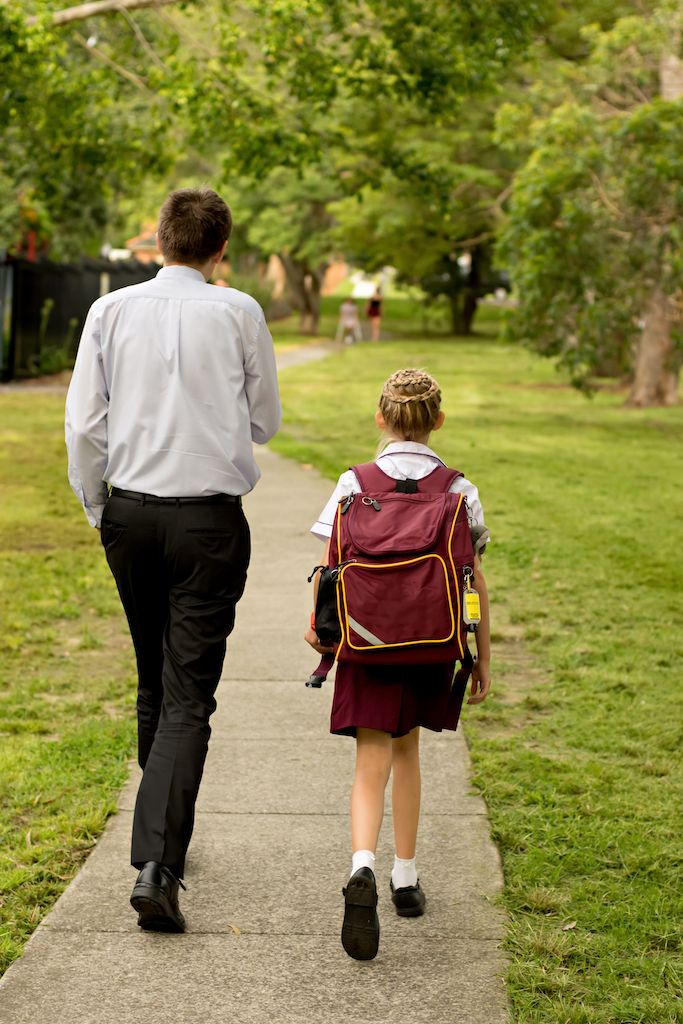If you are the parent of a school age or soon-to-be school age child, you have your homework cut out for you. The assignment: selecting a school. Both public and private schools offer excellent opportunities for your child to learn and grow. It’s a matter of discerning which kind of school fits your child’s specific needs and your desires for his or her education.
When choosing a school, experts and education researchers say parents should look at a variety of factors including educational outcomes, such as rates of graduation and college enrollment; class size; teacher training; affordability; diversity; and availability of programs for special needs.
You can find reliable school information online at greatschools.org., where the following four criteria are suggested for determining your child’s best learning environment: what you want your child to learn (specific subject matter, level of academic difficulty); how your child learns best (particular learning style, challenges); social needs (level of contact with peers); practical matters (scheduling, transportation, athletics/extracurricular activities, etc.).
Worlds of possibility
Since the Lowcountry is abundantly blessed with educational choices, a good place to start sorting them out is by thinking about what you want a school to do for your child. For example, if it is important for your child to learn a second language, you may want to consider Hilton Head Island Elementary School’s IB track, where a dual language program is offered. For an arts-centered education, Hilton Head Island Elementary School for the Creative Arts might be a contender.
If you wish your child to receive a faith-centered education where religion is openly taught and where prayer and other religious practices are encouraged, you have many local options, including John Paul II Catholic School in Ridgeland, St. Francis Catholic School on the island, Hilton Head Christian Academy, Cross Schools in Bluffton, and more. Enrolling your child in a faith-based school has many benefits that are not just religious in nature. There are academic, spiritual, social, and emotional advantages as well. Children will learn and practice a set of moral principles in the classroom every day while being exposed to good role models within the school who actively live their faith and demonstrate strong moral values. Oh, and don’t write off a faith-based school just because your family is not a member of that religion. Most welcome families of all faiths.
Parents of college-bound students may favor Hilton Head Island Preparatory School. According to Sarah DeMaria, director of admissions, the school’s focus is to prepare students for that journey. “It’s rigorous; there’s a lot of accountability. Kids won’t get lost in the shuffle, and nobody flies under the radar,” she said, touting small classes and lots of individualized attention.
Perhaps you are looking for a school with a more flexible schedule. Students at Heritage Academy can choose their start time, with one option allowing them to finish by noon. This facilitates additional learning opportunities and allows them to hold jobs, participate in internships, or pursue rigorous athletic or artistic opportunities outside of school.
According to Amanda O’Nan, head of school, Heritage Academy used to primarily serve kids who were attending the golf or tennis academy. Most were international, not local, she said. And while those students are still being served, the school now accommodates more local students and offers a unique learning environment.
“I had the opportunity to come in and see how the small physical classrooms along with the loving nurture of the teachers really was a perfect fit for kids who needed a small environment,” O’Nan said. At Heritage, the average ratio of kids to teachers is 8:1, with 15 or fewer students in every classroom.
In addition to small classes, one advantage that private schools have over public is that they are not bound by federally regulated educational standards in the same way that public schools are, meaning they are not required to follow Common Core standards or participate in as many standardized tests as public schools do.
“We have the autonomy to do what is best for our students,” Prep’s DeMaria said. But that doesn’t mean it’s an academic free-for-all. Quite the opposite. “We look closely at our standardized testing to see where our kids are performing and align our curriculum at each level, so we know we are preparing students for the next.”
O’Nan is also pleased to have the freedom to introduce “cool classes” that go beyond the realm of standard education. Examples include aviation, animal science, culinary arts, horticulture, leadership, and more.
And while it is true that teachers at independent schools are not required to hold state-issued teaching certificates, DeMaria pointed out that many do, and that professional development is ongoing. Most of Prep’s teachers hold advanced degrees and are experts in their subject matter, she said.
O’Nan also touted teacher competence. “When I interview teachers, there are two criteria: first, they must love young people, and second, they have to know their content,” she said. “I’m looking for a special kind of teacher who loves kids and who makes learning relevant and at the same time can look at mastery before they walk out the door instead of piling homework on them.”
She also stressed the need for students to learn as opposed to Googling and YouTubing their way through. “Kids have learned to be very resourceful, but the idea with education is for them to learn it, not rely on the internet,” O’Nan said.
What’s it going to cost?
One downfall of private education, of course, is cost. However, if deemed the right choice for your child, don’t assume it is unaffordable until you inquire about tuition assistance, which is available at most independent schools in our area.
Public school, on the other hand, is, by law, cost free. But that doesn’t mean a public school is the bargain bin of education. Thanks to federal, state, and local funding, public schools can afford to offer something for everyone. Programs are extensive and ever-evolving to meet the needs of area children and ensure that no child is left behind.
“Public school is designed for everyone,” said Sarah Owen, principal of Hilton Head Island Elementary, IB. “There are programs for students who struggle as well as for students who need more enrichment and rigor. The goal is to work together to find the potential of every student.”
Due to special education laws, public schools must also provide the necessary programs to accommodate and educate children with disabilities and special learning needs. This means that all school districts have special education programs and teachers who are trained to work with special-needs students, which may or may not be the case in private schools.
Generally, the public school population is also more diverse. Children who attend public school may be exposed to a greater diversity of cultures and ethnicities, which may better prepare them for success in our increasingly global society. “Public schools represent our world. It’s real life,” Owen said.
Admittedly, public schools are more regimented and less flexible than private schools, but as for class size, it’s less of a concern in Beaufort County than in some other areas. “Luckily, our district does a really good job,” Owen said.
A parent’s-eye view
Jennifer Risher, local mom of three, has done her homework, and she will tell you that school choice is not a one-size-fits-all proposition. In evaluating options for her daughters, she has chosen public school for one and private for the other two. At one point, each daughter was at a different school, which made for a crazy carpool schedule, she said.
Risher has primarily based her choices on her daughters’ different social and emotional needs. All three of her girls started at Sea Pines Montessori Academy—the school of choice when they moved here based on similarities to a familiar learning environment in Chicago. But as needs changed, the family re-evaluated. Following middle school, her oldest was interested in a change for social reasons. She was looking for opportunities to expand her circle of friends, and, for her, public school seemed to be the best fit, Risher explained. She is currently thriving academically and socially at Hilton Head Island High School.
Risher chose Hilton Head Preparatory School for her other two daughters, but for different reasons. Her middle daughter is quieter than her older sister and is happier in a smaller school. “I think she would get lost in the shuffle in a larger pool of people,” Risher explained, whereas her youngest might tend to slip under the radar achievement-wise. “The smaller setting is better for her—to be pushed.”
The bottom line
Once you’ve narrowed down your options, don’t rely on hearsay and rumor when deciding between private and public. According to greatschools.com, while it can be difficult to evaluate a school, the best way to know if it is right for your child is through a school visit and by talking to school administrators. Don’t be afraid to ask probing questions about the school’s curriculum, culture, and disciplinary policy, as well as how it keeps parents involved and what it expects from parents.
The best school for your child is a highly personal decision based on your family, your values, and the special needs, idiosyncrasies, and interests of your child.
Assessing Your Child’s Needs and Learning Style
You, as a parent, know your child best. Here are a few questions to ask yourself when researching area schools:
- Does your child need a more structured environment?
- Does your child need a less structured environment?
- Does your child need more challenging work?
- Does your child need more individual attention?
- Does your child generally need extra help or more time to complete an assignment?
- Does your child have any special learning needs?
- Does your child need an environment that fosters creativity?
- Does your child need an English language acquisition program?
- Does your child learn best by seeing how things work?
- Does your child learn best by reading about how something works?
- Does your child learn best by listening?
- Does your child like to participate in discussions?
- Does your child like to learn through physical activity?
- Is your child logical or mathematical?
- Is your child musical or artistic?
- Does your child like to learn in groups?
- Does your child like to work alone?
Source: https://www.readingrockets.org/article/four-steps-selecting-school-your-child



